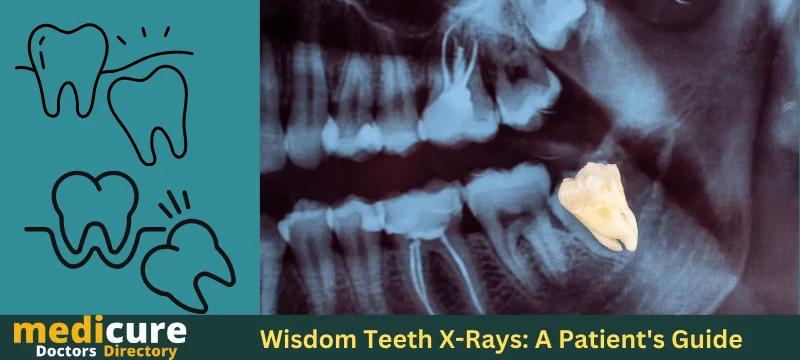MediCure

Wisdom Teeth XRay : A Patient’s Guide
A wisdom tooth is the last set of molars in your mouth, also known as a third molar. Usually, they emerge during late adolescence or early adulthood. Wisdom teeth can often cause dental issues, leading to pain, discomfort, and potential complications. To assess the status of your wisdom teeth, dental professionals often rely on wisdom teeth Xrays, also known as dental panoramic radiographs. In this comprehensive guide, we’ll delve into the world of wisdom teeth Xrays, exploring their importance, the procedure, and common FAQs. Wisdom Teeth XRay
Why Wisdom Teeth XRays Are Important:
- Assessment of Impaction: Wisdom teeth are notorious for becoming impacted, which means they don’t fully emerge from the gum line. Xrays help determine the extent of impaction.
- Position and Alignment: Xrays provide valuable information about the orientation and alignment of wisdom teeth. This data is crucial in planning extractions or monitoring their growth.
- Early Detection of Issues: Wisdom teeth Xrays allow dentists to identify potential problems, such as cysts, tumors, or infection, which might not be visible during a standard dental examination.
The Wisdom Teeth X-Ray Procedure:
- Preparation: Before the Xray, the dental technician will explain the procedure and ensure you are wearing the necessary protective gear, including a lead apron to shield against radiation.
- Positioning: You’ll be asked to stand, sit, or lie down, depending on the type of Xray machine being used. Proper positioning is crucial for clear imaging.
- Panoramic X-Rays: In most cases, a panoramic Xray is used for wisdom teeth assessment. This machine rotates around your head, capturing a complete view of your oral and maxillofacial region.
- Minimal Discomfort: The process is painless and brief, taking only a few seconds to a few minutes. You might be asked to hold your breath to minimize movement during the scan.
- Results: Once the Xray is complete, the images are processed, and your dentist will review them with you. These images are crucial for planning any necessary treatments.
The most common dental problems and how to treat them
Here are some common dental problems and how to treat them:
- Cavities: Cavities are holes in the teeth that are caused by plaque and bacteria. They can be filled by a dentist.
- Gum disease: Gum disease is an infection of the gums that can result in tooth loss. It can be treated with scaling and root planing, which is a deep cleaning of the teeth and gums.
- Wisdom teeth: Wisdom teeth are the four molars that grow in at the back of the mouth. They can be impacted, meaning that they don’t have enough room to grow in properly. Impacted wisdom teeth may need to be extracted.
Also Read: Wisdom Tooth Pain Relief and Treatment
Common FAQs about Wisdom Teeth X-Rays:
Q1: How often should I have wisdom teeth X-rays?
The frequency of wisdom teeth Xrays depends on your specific case and your dentist’s recommendations. In general, they are taken every 1-2 years.
Q2: Are wisdom teeth X-rays safe?
Yes, wisdom teeth Xrays are considered safe. The level of radiation exposure is minimal, and protective measures are taken to further minimize risks.
Q3: Do I need to remove my wisdom teeth if they’re impacted?
Not necessarily. The decision to remove impacted wisdom teeth depends on the degree of impaction, your age, and whether they are causing issues like pain or infection.
Conclusion:
Wisdom teeth Xrays play a crucial role in assessing the condition of your third molars and ensuring your oral health. These painless and safe imaging procedures provide essential information for your dentist to make informed decisions about your wisdom teeth. If you have concerns about your wisdom teeth, consult with a dental professional who can guide you through the process and provide the best course of action for your specific situation.